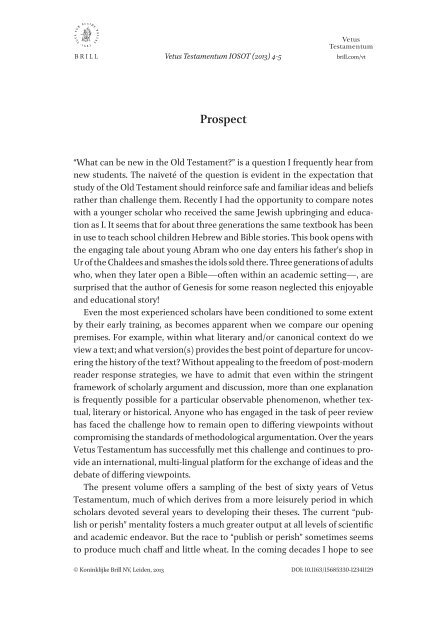Special Issue IOSOT 2013 - Books and Journals
Special Issue IOSOT 2013 - Books and Journals
Special Issue IOSOT 2013 - Books and Journals
You also want an ePaper? Increase the reach of your titles
YUMPU automatically turns print PDFs into web optimized ePapers that Google loves.
Vetus Testamentum <strong>IOSOT</strong> (<strong>2013</strong>) 4-5<br />
Vetus<br />
Testamentum<br />
brill.com/vt<br />
Prospect<br />
“What can be new in the Old Testament?” is a question I frequently hear from<br />
new students. The naiveté of the question is evident in the expectation that<br />
study of the Old Testament should reinforce safe <strong>and</strong> familiar ideas <strong>and</strong> beliefs<br />
rather than challenge them. Recently I had the opportunity to compare notes<br />
with a younger scholar who received the same Jewish upbringing <strong>and</strong> education<br />
as I. It seems that for about three generations the same textbook has been<br />
in use to teach school children Hebrew <strong>and</strong> Bible stories. This book opens with<br />
the engaging tale about young Abram who one day enters his father’s shop in<br />
Ur of the Chaldees <strong>and</strong> smashes the idols sold there. Three generations of adults<br />
who, when they later open a Bible—often within an academic setting—, are<br />
surprised that the author of Genesis for some reason neglected this enjoyable<br />
<strong>and</strong> educational story!<br />
Even the most experienced scholars have been conditioned to some extent<br />
by their early training, as becomes apparent when we compare our opening<br />
premises. For example, within what literary <strong>and</strong>/or canonical context do we<br />
view a text; <strong>and</strong> what version(s) provides the best point of departure for uncovering<br />
the history of the text? Without appealing to the freedom of post-modern<br />
reader response strategies, we have to admit that even within the stringent<br />
framework of scholarly argument <strong>and</strong> discussion, more than one explanation<br />
is frequently possible for a particular observable phenomenon, whether textual,<br />
literary or historical. Anyone who has engaged in the task of peer review<br />
has faced the challenge how to remain open to differing viewpoints without<br />
compromising the st<strong>and</strong>ards of methodological argumentation. Over the years<br />
Vetus Testamentum has successfully met this challenge <strong>and</strong> continues to provide<br />
an international, multi-lingual platform for the exchange of ideas <strong>and</strong> the<br />
debate of differing viewpoints.<br />
The present volume offers a sampling of the best of sixty years of Vetus<br />
Testamentum, much of which derives from a more leisurely period in which<br />
scholars devoted several years to developing their theses. The current “publish<br />
or perish” mentality fosters a much greater output at all levels of scientific<br />
<strong>and</strong> academic endeavor. But the race to “publish or perish” sometimes seems<br />
to produce much chaff <strong>and</strong> little wheat. In the coming decades I hope to see<br />
© Koninklijke Brill NV, Leiden, <strong>2013</strong> DOI: 10.1163/15685330-12341129








![Am HaSefer [Volk des Buches] - Books and Journals](https://img.yumpu.com/20648352/1/174x260/am-hasefer-volk-des-buches-books-and-journals.jpg?quality=85)







